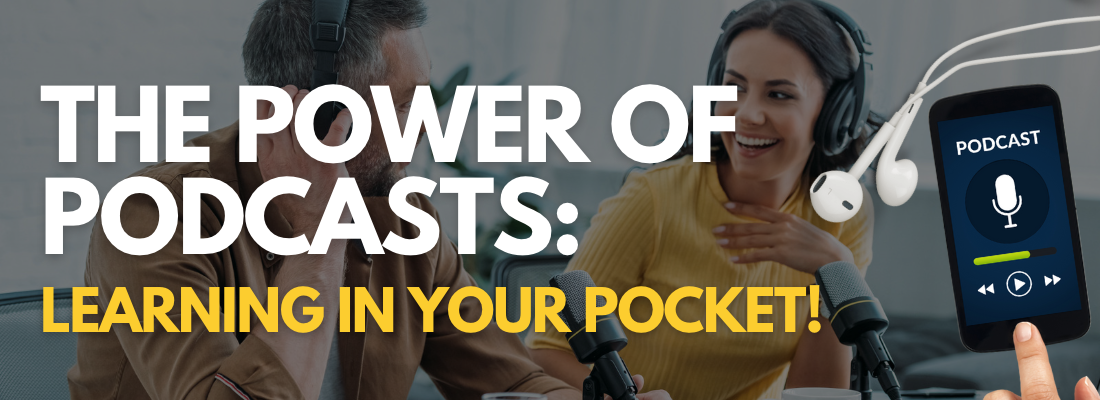The Power of Podcasts: Learning in Your Pocket!
Podcasts have dramatically risen in popularity in recent years, due to their easily accessible and portable nature, diverse range of engaging content and intimate and engaging conversational format. This growth has been fuelled by the increasing accessibility of podcasting technology and the rise of streaming platforms like Spotify, which have made it easier than ever for creators to distribute their content and reach wider audiences. People listen to podcasts for a variety of reasons, whether this be to catch up on the latest news, listen to an audiobook or listen in to conversations and debates about a particular topic.
Podcasts are also a great tool for learning new skills and accessing educational content. Let’s have a closer look at why they are so effective!

Podcasts can be listened to wherever you go!
1) Learn on the go
One of the biggest appeals of podcasts is that they can be listened to on the go. Podcasts are super convenient as they can be effortlessly downloaded to your smartphone or tablet, letting you carry learning with you wherever you go, right in your pocket! So whether you’re on the train, taking a walk, running errands, or relaxing at home, you can always plug into a podcast and learn something new. Podcasts have an advantage over other types of learning as you don’t have to worry about sitting down and watching a video, reading an article, or attending a class; you can just plug in your headphones and start learning!
2) Wide range of topics and learning styles
There are over 5 million podcasts on Spotify alone that cover a huge range of topics, from science, technology, business, education, entertainment, and tonnes more! No matter your learning goals, there will be something out there for you to tune in to! There are also a wide range of different podcast formats to suit your learning style. There are interview-style shows, narrative driven stories, discussion and debates, solo-hosted shows and even live podcasts! This means that listeners can find a podcast with a format that is best suited to their learning style, making learning more effective and engaging.

Podcasts are more conversational and personal than traditional learning styles
3) Stay engaged
Listeners love podcasts as they often don’t feel like traditional, structured forms of learning. Podcasts can be very conversational and intimate – almost like having a conversation with a friend! The personal nature of podcasts and the storytelling elements that are used make them more engaging and interesting to listeners. If listeners enjoy their learning, they are more often to keep coming back to it!
4) Connect with experts
Podcasts often feature experts in various fields, providing listeners with insights and opinions that may not be available elsewhere. This can be especially beneficial for those who are looking to expand their knowledge or gain a deeper understanding of a particular subject. By tapping into the expertise of these hosts and guests, listeners can learn from the best and stay up to date with the latest developments in their areas of interest.

Podcasts can be held live, and podcast hosts sometimes host in-person panels and events!
5) Learning Communities
Podcasts bring together listeners from all around the world who share similar interests. This generates a sense of community which is further encouraged by podcast hosts who encourage their listeners to engage with each other through social media, in-person meet-ups and other channels. Podcasts fan bases are great places for like-minded individuals to continue the discussion after the podcast has ended, sharing knowledge and insights and learning from each other!

Where can I find great podcasts?
There are many ways to find great podcasts, but here are a few suggestions to get you started:
1) Podcast directories: There are several directories where you can browse and search for podcasts, such as Apple Podcasts, BBC Sounds, Spotify, Google Podcasts, and Stitcher. These directories allow you to discover new podcasts based on categories, ratings, reviews, and recommendations.
2) Social media: Many podcast hosts and fans use social media platforms such as Twitter, Instagram, and Facebook to share their favourite shows and episodes. By following relevant hashtags or accounts, you can discover new podcasts and engage with the community.
3) Podcast networks: Many popular podcasts belong to larger networks such as NPR, Gimlet, and Wondery. Exploring these networks can lead you to discover other shows that share similar themes or styles.
4) Word of mouth: Don't underestimate the power of recommendations from friends, family, or colleagues. Ask people in your network if they have any favourite podcasts they would recommend.
5) Podcast events: Attending podcast events, such as conferences or live shows, can be an excellent way to discover new podcasts and meet the hosts in person.
Remember, there is no shortage of great podcasts out there, so take some time to explore and find the ones that interest you the most!

Are podcasts CPD recognised?
As of yet, there is no CPD accreditation specifically for Podcasts. At The CPD Group, we’re dedicated to recognising all types of quality learning through innovative new accreditation services – so watch this space! 👀


Discussion (0)
Join the conversation and share your insights with our community
Join Our Community
Share your expertise, ask questions, and engage with fellow CPD professionals
Start the Conversation
Be the first to share your thoughts on this article. Your insights could help other professionals in their CPD journey.